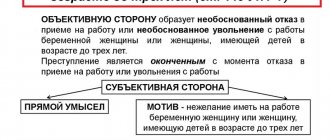What it is?
Limited (partial) financial liability is a measure of compulsion to compensate for damage caused to the employer in an amount not exceeding the employee’s average monthly salary. It occurs unless otherwise specified in the employment agreement.
The following conditions must be met:
- Demand compensation only for actual damage , i.e. Lost profits and other damage cannot be recovered.
- The amount should not exceed a month's salary.
When calculating average income, all payments must be taken into account, regardless of their source. It will not be possible to avoid full liability if the damage occurred as a result of a crime, offense or intentional action.
The most common cases of partial liability are:
- Reimbursement of fines;
- Damage/destruction of valuables;
- Damage/loss of documents, if this led to real damage;
- Violation of documentation procedures resulting in harm;
- Forced downtime or absenteeism.
The employee undertakes to pay the employer the costs of repairs, restoration of documents or property.
Read more about the methodology for calculating average earnings for payment of damages in this material.
What is direct actual damage
In accordance with the provisions of Article 238 of the Labor Code of the Russian Federation, all employees bear a certain financial responsibility to their managers. If, as a result of a gross violation of safety regulations or as a result of poor performance of official duties, the employer suffered some damage, expressed in material terms, then the responsible employee will be obliged to compensate the entire amount of damage.
Article 238 of the Labor Code of the Russian Federation also introduces the concept of direct actual damage. The legislator draws attention to the fact that the obligation to compensate for damages will be applied to the employee if his direct fault is established.
Direct actual damage refers to the employer’s material losses, namely a real decrease in the organization’s property mass or a significant deterioration in its condition.
As a result, the employer is forced to spend additional funds aimed at restoring damaged property, or to compensate for damage caused by the employee to third parties (if the damaged property does not belong to the organization, but is under its responsibility).
At the same time, it is separately stipulated that for the damage caused, the employee bears financial responsibility both for direct damage and for the damage that occurred to the employer as a result of reimbursement of costs to other persons acting as owners of specific property.
It is worth noting that the very definition of direct actual damage provides that the blame rests entirely with the employee. But it is noted that in some situations the employee will not be held liable. In particular, this applies to situations when an organization has introduced a new production line or is mastering new technological developments. In this situation, all damage will be transferred to the cost of the final product, and the employee’s financial liability will not be established.
Legislative regulation
The issue of limited financial liability is regulated by Article 241 of the Labor Code of the Russian Federation (hereinafter referred to as the Labor Code of the Russian Federation). To calculate average earnings, you must also adhere to the rules of Article 139 of the Labor Code of the Russian Federation. The very principles of calculation are contained in Government Decree No. 922 “On the specifics of the procedure for calculating average wages.”
Article 243 of the Labor Code of the Russian Federation fixes the circumstances of full financial liability, and Article 239 of the Labor Code of the Russian Federation establishes the conditions when it does not occur.
Resolution of the Ministry of Labor of the Russian Federation No. 85 establishes a list of positions for which full financial responsibility is provided.
Material liability of the employee
An employee’s financial liability is his obligation to compensate for damage caused to the employer. But it, however, arises only if the employee is at fault (clause 1 of Article 233 of the Labor Code of the Russian Federation). The employee is obliged to compensate the employer only for direct actual damage caused to him; lost income (lost profits) cannot be recovered from the employee (Article 238 of the Labor Code of the Russian Federation).
Direct actual damage is considered to be a real decrease in the employer’s property (or the property of third parties located by the employer, if he is responsible for the safety of this property) or deterioration in the condition of this property.
Examples: shortage of cash or property, damage to materials and equipment, costs of repairing damaged property, payments for forced absence or downtime, the amount of a fine paid.
The Labor Code of the Russian Federation establishes two types of financial liability: individual and collective (team). Individual liability is divided into limited liability and full liability. As a rule, in labor relations limited financial liability is applied, when for damage caused to the employer the employee bears financial responsibility within the limits of his average monthly earnings (Article 241 of the Labor Code of the Russian Federation), determined on the basis of Article 139 of the Labor Code of the Russian Federation and the Regulations on the specifics of the procedure for calculating average wages (approved by Decree of the Government of the Russian Federation dated December 24, 2007 No. 922).
The Labor Code of the Russian Federation does not establish a specific list of cases when an employee can be held to limited liability. In practice these cases are:
• loss of tools, instruments, devices;
• loss of documents;
• damage or destruction of the employer's property due to negligence or negligence;
• shortage of funds as a result of non-fulfillment or improper fulfillment by an individual entrepreneur of his contractual obligations due to the fault of the employee, etc.
If the amount of damage does not exceed average earnings, then recovery is made by order of the employer. He must make such an order no later than one month from the date of final determination of the amount of damage caused to him in accordance with Article 248 of the Labor Code of the Russian Federation.
If the employee does not agree to compensate for the damage voluntarily or the amount of damage exceeds the average monthly salary, then recovery of damages is carried out only in court.
It should also be remembered that when deducting amounts of damage from an employee’s wages, it must be remembered that the total amount of all deductions for each payment of wages cannot exceed 20%, and in cases provided for by federal laws - 50% of the wages due to the employee ( Article 138 of the Labor Code of the Russian Federation).
If collection is made under several enforcement documents, then the employee in any case must be retained 50% of the salary.
This restriction does not apply to deductions from wages when serving correctional labor, collection of alimony for minor children, compensation for harm caused to the health of another person, compensation for harm to persons who suffered damage due to the death of the breadwinner, and compensation for damage caused by a crime. In these cases, the amount of deductions cannot exceed 70%.
Thus, any employee who unintentionally causes damage to the employer is liable only to the extent of his monthly salary. However, if the damage was caused in a state of alcohol, drug or other intoxication, as well as in other cases listed in Article 243 of the Labor Code of the Russian Federation, then the rules on full financial liability may be applied to such an employee, i.e. the obligation to compensate for damage in full size.
Most often, agreements on full liability are concluded in trade, catering, consumer services, etc., and agreements on full liability should be concluded only with those employees who constantly deal with material assets, their reception, processing, storage and vacation.
Thus, an agreement on full financial liability can be concluded, in particular, with cashiers, controllers, cashier controllers, managers, administrators, sellers, merchandise experts, etc. (the full list is established by Resolution of the Ministry of Labor of Russia dated December 31, 2002 No. 85). This is a closed list and cannot be expanded. An agreement on full financial liability concluded with an employee not named in this list has no legal force. A separate written agreement on full financial responsibility must be concluded with each employee.
The conclusion of an agreement on full financial responsibility is an agreement of the parties, that is, its conclusion is a right, and not an obligation, of the parties to the employment contract. However, if the entrepreneur has not concluded an agreement with the employee on full financial liability, then it will be impossible to recover damages in full. The employee will be liable only to the extent of his average monthly earnings.
However, financial liability in the full amount of damage caused can be assigned to the employee only in cases provided for by the Labor Code of the Russian Federation or other federal laws. By the way, for some reason it is generally accepted that minor workers cannot bear full financial responsibility. It's a delusion. Minor workers bear full financial responsibility, but only:
• for intentional causing of damage;
• damage caused while under the influence of alcohol, drugs or other toxic substances;
• damage caused as a result of a crime or administrative offense (Article 242 of the Labor Code of the Russian Federation). According to Article 243 of the Labor Code of the Russian Federation, financial liability in the full amount of damage caused is assigned to the employee in the following cases:
• when, in accordance with the Labor Code of the Russian Federation or other federal laws, the employee is financially responsible in full for damage caused to the employer during the performance of the employee’s job duties;
• shortage of valuables entrusted to him on the basis of a special written agreement or received by him under a one-time document;
• intentional causing of damage;
• causing damage while under the influence of alcohol, drugs or other toxic substances;
• causing damage as a result of criminal actions of an employee established by a court verdict;
• causing damage as a result of an administrative violation, if established by the relevant government body;
• disclosure of information constituting a secret protected by law (state, official, commercial or other), in cases provided for by federal laws;
• damage caused while the employee is not performing his job duties. This list is closed and cannot be expanded.
An agreement on full financial liability can be concluded not only with an individual employee, but also with an entire team (team).
Collective liability can be introduced in cases where employees jointly perform work related to the storage, processing, sale (release), transportation, use or other use of the values transferred to them, and it is impossible to delimit the responsibility of each employee for causing damage and conclude an agreement with him on compensation for damage in full (Article 245 of the Labor Code of the Russian Federation).
A written agreement on collective (team) financial liability for damage is concluded between the employer and all members of the team (team).
Under an agreement on collective (team) liability, valuables are entrusted to a predetermined group of persons, who are assigned full financial responsibility for their shortage.
To be released from financial liability, a member of a team (team) must prove the absence of his guilt.
In case of voluntary compensation for damage, the degree of guilt of each member of the team (team) is determined by agreement between all members of the team (team) and the employer. When recovering damages in court, the degree of guilt of each member of the team (team) is determined by the court.
The employer's decision to establish full collective (team) financial liability is formalized by order (instruction) of the employer and announced to the team (team). The employer's order (instruction) to establish full collective (team) financial liability is attached to the employment contract.
Let us note that the list of works during the performance of which full collective (team) financial liability for the shortage of property entrusted to employees can be introduced is also approved by the above-mentioned Resolution of the Ministry of Labor of Russia No. 85.
Thus, collective (team) financial responsibility can be assigned in accordance with the contract to workers performing, in particular, the following work:
• for acceptance and payment of all types of payments;
• payments for the sale (sale) of goods, products and services (including not through a cash register, through a cash register, without a cash register through a seller, through a waiter or other person responsible for making payments);
• servicing vending and cash machines;
• production and storage of all types of tickets, coupons, subscriptions, including subscriptions and coupons for food (food products), other signs (documents) intended for payments for services;
• purchase (reception), sale (trade, release, sale) of services, goods (products), preparing them for sale (trade, release, sale);
• acceptance for storage, processing (manufacturing), storage, accounting, release (issuance) of material assets in warehouses, bases, storerooms, points, departments, areas, etc.;
• accepting cultural and household items and other material assets from the population for storage, repair and for performing other operations related to the manufacture, restoration or improvement of the quality of these items (valuables), their storage and other operations with them;
• rental of cultural and household items and other material assets to the population;
• acceptance and processing for delivery (escort) of cargo, luggage, postal items and other material and monetary assets, their delivery (escort), delivery (delivery), etc.
By the way, the same Resolution of the Ministry of Labor of Russia No. 85 also contains standard forms of agreements on full individual financial responsibility and on full collective (team) financial responsibility. These forms are not mandatory, but they are developed in great detail, developed by specialists from the Russian Ministry of Labor, and their use is more than justified. Moreover, an incorrectly concluded agreement on full financial liability cannot serve as a basis for bringing the employee to full financial liability.
Thus, the standard form of an agreement on full individual financial responsibility includes a list of the rights and obligations of the employee, such as:
• treat with care the employer’s property transferred to him for the implementation of the functions (responsibilities) assigned to him and take measures to prevent damage;
• promptly inform the employer or immediate supervisor about all circumstances that threaten the safety of the property entrusted to him;
• keep records, draw up and submit in the prescribed manner commodity-monetary and other reports on the movement and balances of the property entrusted to him;
• participate in the inventory, audit, and other verification of the safety and condition of the property entrusted to him.
The employer, in turn, undertakes:
• create for the employee the conditions necessary for normal work and ensuring the complete safety of the property entrusted to him;
• familiarize the employee with the current legislation on the financial liability of employees for damage caused to the employer, as well as other regulatory legal acts (including local ones) on the procedure for storage, reception, processing, sale (release), transportation, use in the production process and carrying out other transactions with the property transferred to him;
• carry out inventory, audits and other checks of the safety and condition of property in the prescribed manner.
As for the agreement on full collective (team) financial responsibility, it defines the procedure for appointing a team (team) leader, the entry of new members into the team, the departure of members from the team, the procedure for maintaining records and reporting, as well as the procedure for compensation for damage.
The agreement on full financial liability is drawn up in two copies, one of which remains with the employer, and the other is transferred to the employee, and in the case of collective liability - to the team leader.
In conclusion, we note that termination of an employment contract after damage has been caused does not relieve the parties to this contract from financial liability. When dismissing a financially responsible person, a document confirming the absence of material claims against the dismissed employee must be attached to the order (instruction) for dismissal.
IMPORTANT:
As a general rule, an employee is obliged to treat the employer’s property with care, and the employer has the right to demand that employees take care of their property (Article 21 of the Labor Code of the Russian Federation), as well as to hold them financially liable (Article 22 of the Labor Code of the Russian Federation).
The basis for bringing the team to collective financial responsibility are the results of the inventory, which established the presence of damage.
If collection is made under several enforcement documents, then the employee in any case must be retained 50% of the salary.
Termination of an employment contract after damage has occurred does not relieve the parties to this contract from financial liability.
Anastasia AZIEVA, lawyer
Who's carrying it?
The employee bears partial responsibility if full financial responsibility is not established for him . Positions not specified in Resolution of the Ministry of Labor No. 85 are subject to limited property liability.
Sample list of positions:
- Secretaries;
- Office workers;
- Officials and non-managerial specialists of institutions;
- Technical personnel;
- Temporary and seasonal workers;
- Non-staff employees;
- Remote employees working with company equipment.
A local legal act or labor agreement may establish partial financial liability, although it is not necessary to specifically state this. The penalty will be imposed by force of law. The concluded employment contract is the basis for bringing to responsibility.
After the loss has been proven and calculated, the employer issues an order or instruction. This document contains the final decision and sets out the amount and period of compensation.
How to draw up a full liability agreement
Agreements on financial liability can be individual or collective (team).
Collective - when people work together and it is impossible to know who to ask. For example, there are three people working in a warehouse. The entrepreneur carried out a monthly inventory and discovered that 5 boxes of shoes were missing. Each employee will pay a third.
Under the collective agreement there is a presumption of guilt. By default, the employee is guilty, but he can prove the opposite - Art. 245 Labor Code of the Russian Federation. For example, he did not enter the warehouse for a whole month, and during the last inventory the shoes were still there. Then there is nothing to collect money for.
How to introduce collective responsibility:
- Issue an order.
— Ask employees to sign an agreement (standard form).
— Appoint a “brigade” leader.
Example: how liability agreements helped in court
An entrepreneur hired two salespeople for a clothing store. He drew up employment contracts and an agreement on collective financial responsibility.
One day, an entrepreneur noticed that there was too little money in the online cash register. The inventory showed that 62,880 rubles were missing. The sellers were supposed to pay the shortfall, but they refused.
Then there was a long dispute with a statement to the police, a trial and accusations of bias on the inventory commission. But in the end, the court said that clothing sellers are fully responsible for the cash register, and the inventory is in order. You will have to pay 32,483 ₽.
Case No. 33-4711/2019
Standard form of an agreement on full individual liability
Standard form of an agreement on full collective liability
The goods and money are transferred to the employee according to the act or an inventory is taken before the start of work.
Conditions of occurrence and collection procedure
Partial financial liability arises under the following conditions:
- The damage occurred during the performance of official duties;
- The employee's actions were unintentional;
- The fact and amount of damage has been established and documented;
- There are no factors excluding guilt;
- The damages are direct and actual.
If there is damage to the organization, the employer must follow certain rules:
- Appointment of a commission to investigate;
- Providing the employee with the opportunity to write an explanatory note;
- Determination of the amount of damage;
- The commission draws up an act;
- Issuance of an order by the employer (no later than a month from the date of establishing the amount of losses);
- The culprit must be familiarized with the commission’s act and the order for signature. These documents are then filed in a special journal.
If the rule on the deadline for issuing the order was not observed, then collection is possible only through judicial proceedings .
The employer has the right to reduce the amount recovered or refuse to restore the loss. At the same time, the financial condition and misconduct of the employee are taken into account.
The employee and the employer may enter into an agreement establishing payment by installments and other features of compensation. The employee must provide a written commitment indicating payment terms.
Watch a video about the procedure for claiming damages from an employee:
In what cases does financial liability arise?
First of all, we list the conditions under which the issue of financial liability arises. The fact is that all conditions must be met simultaneously:
- Causing damage. And the best evidence in this case is the damaged property itself, be it broken office equipment, damaged vehicles or an inventory report, where it is clear in black and white what damage has been caused. However, in any case, the fact of damage to property by an employee must be legally recorded by drawing up a report on the discovery of damage, and an explanatory statement must be required from the employee.
- The cause of the damage is the unlawful action or inaction of the employee. That is, the employee is guilty when he failed to fulfill his duties or committed an illegal act that led to damage.
- Direct connection between the first point and the second. In particular, it must be obvious that the damage was caused precisely because of his negligent behavior and irresponsible actions.
- Employee's fault. A logical explanation is required - did the person do it on purpose or did it happen “by accident” (that is, is he a criminal or simply irresponsible).
And if all these conditions are “fulfilled” at the same time, and the employee is caught red-handed, then the question of financial liability appears quite natural.
When determining the degree of a person’s guilt, one must take into account whether he could not have done this, whether he had the opportunity to prevent the damage. There are a number of circumstances in which a person’s fault is excluded, despite the damage caused. These include: self-defense, extreme necessity, ordinary business risk, employer’s disregard for normal office supplies. If the situation is ambiguous and controversial, then you need to be guided by Article 401 of the Civil Code of the Russian Federation, Articles 37 and 39 of the Criminal Code of the Russian Federation and the resolution of the Supreme Court of the Russian Federation dated November 16, 2006.
Order/instruction
An order is a final document issued by the employer. The text indicates the title of the document and the name of the organization. The reason for issuing the order and the personal data of the employee must be indicated .
Sample order for compensation of damages by an employee:
When damage is caused, it is worth investigating especially carefully. The onus is on the employer to prove damages. If it is impossible to resolve the case within the organization, the employer may go to court. If at the meeting it is revealed that responsibility must be full, the damage will still be recovered in the amount of average monthly earnings.
How to calculate the amount of property damage
No matter how trivial it may sound, but according to market prices. That is, if an employee broke a monitor, which at the time of the fall cost 10,000 rubles, then the employee must pay that much. But no less than the figure of its value indicated in the accounting records, taking into account depreciation. More details can be found in Article 246 of the Labor Code of the Russian Federation.
Before demanding from an employee the exact figure of the damage caused, you must first confirm it. To do this, you need to conduct an inspection, an inventory, and, if necessary, even create a special commission to investigate. The results of such a check must be documented in a special statement. The next step should be to require a written explanation from the employee. If he refuses to write it, it will be necessary to draw up a corresponding act (more about this in Article 247 of the Labor Code of the Russian Federation).







